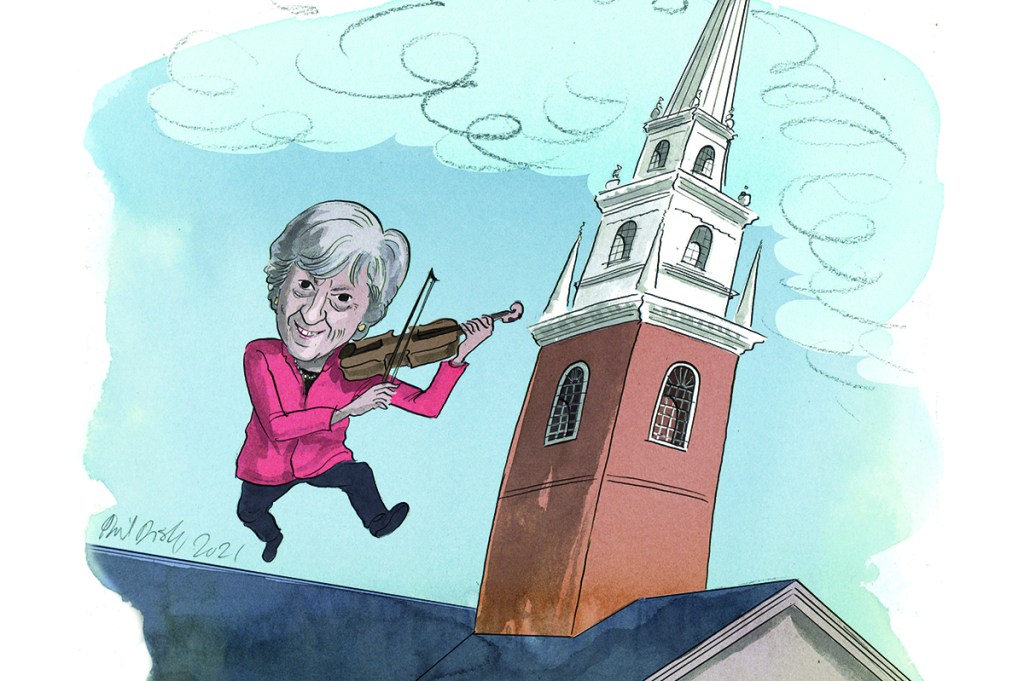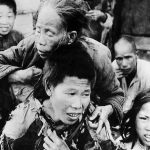On January 1, 1993, I arrived at Harvard to take up a newly endowed professorship in Yiddish literature. It seemed preposterous: me at Harvard, Yiddish at Harvard. The university had never figured in my aspirations. My impressions of the university had been formed mostly from what I knew of its program in Jewish studies, which was jokingly referred to as ‘the Yeshiva on the Charles’ because of its emphasis on Talmudic and medieval sources. Its almost exclusively male Department of Near Eastern Languages and Civilizations felt obliged to appoint a female.
My gender played an even more prominent part in the deliberations of the Department of Comparative Literature where I was to hold a joint appointment. By 1993, no self-styled academic conservative like me — who taught literature old style, reading along the grain rather than against it, with appreciation for its texture and its historical, cultural and linguistic contexts — could have won the vote of some of the literature department’s trendsetters had I not been a woman. In yet another irony, these progressive members of the committee did not know that I had opposed affirmative action for women at my then-job at McGill University. In short, I was appointed on the basis of a policy I deplored. Still, I accepted the position and the following year I was made the Center’s director. Having been assured that my chair would be accompanied by a lectureship in Yiddish language, I set up language instruction, undergraduate courses, and a track for graduate students supported by generous stipends.
In coming to Harvard to teach Yiddish literature, I had not considered Jewishness a matter of concern. There had been little anti-Israel agitation or Jewish discomfort at McGill, and I expected even less of it at Harvard. But university culture was becoming less tolerant of Jewishness, not more, quite as though it had expected Jews to shed it in return for being admitted.
The percentage of Jewish students probably peaked about the time I came to Harvard and dropped precipitously with the boost of affirmative action into virtual quotas. When I took up my position there, most of my colleagues were traditional scholars, having been hired — as a Chinese exchange student would assure me — because they were considered ‘best in the world’, a ludicrous standard to my way of thinking but one that, in emphasizing academic excellence, underscored what was expected of us. I was not involved in undergraduate admissions, but at the graduate level, I saw only academic criteria being applied. Affirmative action in faculty appointments was only creeping in when I arrived and there were no administrative bureaucrats to monitor ideological and political compliance. I would witness academic decline over the next 21 years: a decline I was powerless to arrest and see no immediate prospect of being reversed.
I had been delighted when Dean Jeremy Knowles asked me during our first interview whether I would be prepared to teach in Harvard’s version of ‘the Core’, a liberal arts curriculum from which undergraduates were obliged to select 10 courses over their four years. I planned a ‘great Jewish books’ course featuring writers from Franz Kafka and Isaac Bashevis Singer to Primo Levi and Saul Bellow, thus including major international works to represent the multilingual quality of modern Jewish literature and to track the experience of Jews in the 20th century.
At the start of one semester, I noticed a girl wearing a hooded sweatshirt so low over her forehead one could scarcely see she was African American. She told me she was stymied by the first assigned text: Sholem Aleichem’s Tevye the Dairyman (the source of Fiddler on the Roof) in a translation generously sprinkled with transliterated Hebrew quotations. I assured her that almost everyone in the class would need to resort to the glossary provided at the back of the book, and then tried to show her that the game might prove worthwhile if she could just relax and enjoy it. From then on, she came to see me almost weekly and was soon doing most of the talking.
Thanking me for the course at the end of the semester, my student surprised me by singling out Saul Bellow’s Mr Sammler’s Planet, a demanding indictment of the counterculture and permissiveness of the 1960s. It was not a young person’s book, but it had had its effect. ‘When I arrived here,’ the student said, ‘I was the you-go girl! I was going to change everything. I was going to change the world. Well, this book showed me that I could also change it for the worse.’ She articulated better than I had done what a course on modern Jewish fiction could hope to transmit.
I had the opposite experience with a Muslim student from Pakistan who refused to deal with Shmuel Yosef Agnon’s Hebrew novella, In the Heart of the Seas, because he deemed it racist. A student could only find this ‘racist’ if he was raised to disbelieve in the Bible’s formation of the Jewish people and the natural right of the Jews to their homeland. The Arab and Soviet coalition had rammed through the villainous resolution equating Zionism with racism at the United Nations; this highly intelligent young man took that equation as much on faith as Agnon’s travelers believed in their return to Zion.
The student had until then been doing very well. It being too late to withdraw from the course, he demanded to complete it without having to deal with this book. This was technically possible since assignments and exams left him enough to choose from without it. I discussed it with a teaching assistant, and we decided to accede to his request. We had by then experienced enough of Harvard’s swelling bureaucracy to know what it would cost in time and energy if we were to refuse his petition.
I have always regretted taking the easy way out. It was obvious that Agnon’s novella had as much to teach this student as Mr Sammler’s Planet had the other. He might have realized that it was in many ways closer to his own cultural tradition than other books in the course. If there was any truth to the claim that college exposed students to diversity or offered any hope of undoing anti-Jewish prejudice, here was an opportunity. Instead, after an unsuccessful attempt at persuading him to deal with the book, I allowed a member of Harvard’s ‘educated elite’ to have his prejudices confirmed.
Now, at the beginning of the third decade of the 21st century, ‘political correctness’ on campus is taken for granted. But what I experienced then was less the direct coercive tyranny of leftism than a pervasive culture of capitulation and pusillanimity, with everyone from administrators to deans and professors to students and even the campus police looking over his or her shoulder in fear of censure by others. The fear was only justified on the part of those being silenced: at one Harvard event, Ayaan Hirsi Ali required stricter security arrangements than did many heads of state.
The affirmative action that Harvard implemented required lying. Departments looking for the ‘best’ person to fill a position were obliged to demonstrate, not that they had conducted a fair and open search, but rather that they had interviewed an appropriate percentage of women and other ‘minorities’. Since individual merit and group diversity are contradictory goals, the entire process was corrupt irrespective of outcome. At one departmental meeting, when the chair asked us to supply arguments for a member’s candidacy for promotion, someone at the table hooted, ‘Why bother with all this? He’s Hispanic!’ I was the only one who laughed at this eruption of suppressed truth.
When I arrived at Harvard, I enjoyed the friendship of a number of conservatively-inclined faculty members, such as the political philosopher Harvey Mansfield. By the time I left in 2014, almost all were gone. One could be certain that no strictly meritorious appointees had replaced them. At the same time, being visibly conservative was a personal advantage. I was a sounding board for students who wanted to affirm but not advertise a similar orientation or were just intellectually curious. One day I was visited by several girls who asked me to become faculty adviser to a new right-wing Catholic club. Being neither Christian nor a categorical opponent of abortion, I suggested someone else could more truly represent them. But I had gotten to the point of welcoming almost any challenge to liberal pieties and was very pleased that they considered me an ally.
In the summer of 2001, Lawrence Summers, President Clinton’s former secretary of the treasury, became president of Harvard. He exuded an aura of competence and a willingness to wield authority, and I felt that the university might reverse the downhill drift that I had sensed since I came on board. Summers was popular among students, but not among professors. Around the time of Larry’s appointment, some 70 faculty members from Harvard and MIT petitioned their universities to divest from Israel and from companies that sell arms to Israel. Led by MIT professor Noam Chomsky, the petition intended to stoke opposition to Israel whether or not it achieved its stated goal. The fact that Larry was Jewish had until then been irrelevant. But once Israel became a campus issue, the Jewishness of the president came under scrutiny.
Summers stated in his maiden address at Memorial Church that anti-Jewish politics had not ended with the Holocaust but had rather morphed into attacks on Israel. Academic communities, he said, were obliged to admit expression of all viewpoints, and ‘there is much in Israel’s foreign and defense policy that can be and should be vigorously challenged’. But, he added, ‘serious and thoughtful people are advocating and taking actions that are anti-Semitic in their effect if not their intent’.
Predictably, at the next faculty meeting, Summers was accused of stifling free expression — with an open bellicosity that I had never before witnessed in that room. His accuser, J. Lorand Matory, a professor of anthropology and African and African American studies, was backed up by a chorus of obviously orchestrated supporters. Although the press was excluded from faculty meetings, the next day’s Boston Globe carried a front-page item reporting the charge.
This offensive should have come as no surprise. In the summer of 1992, just before I was to begin teaching at Harvard, its chair of African and African American studies, Henry Louis ‘Skip’ Gates Jr, had published in the New York Times an article entitled ‘Black Demagogues and Pseudo-Scholars’, advising that while anti-Semitism was generally declining, it was on the rise among black Americans, especially the younger and more educated. Clearly troubled by ‘crackpot’ theories, Gates cautioned that this was anti-Semitism from the top down, ‘engineered and promoted by leaders who affect to be speaking for a larger resentment’.
But now Gates said nothing in defense of the president, and Larry, instead of calling out Matory and his supporters as he had the Chomsky petition, tried to ignore the attacks. Having placed my hopes on Larry’s leadership, I watched the unraveling of his authority with real horror. His temperamental mildness, perceived as timidity, inspired disaffected corners of the university to rise against him.
Though the term ‘intersectionality’, coined in 1989 by black feminist Kimberlé Williams Crenshaw, had not yet come into common use, the campus grievance coalition made Larry Summers its first target. Campus feminists administered the coup de grâce after a small private conference on ‘Diversifying the Science and Engineering Workforce’ to which Summers had been invited. Asked to provoke discussion of why, although more women than men now attended university, women did not enter fields like mathematics, engineering and the physical sciences in the same proportions, Larry offered a range of ideas, starting with the general fact that certain groups are ‘underrepresented’ in certain activities. He tentatively asked whether the discrepancy might be due — in declining order of importance — to female choices, unequal distribution of cognitive skills across the sexes, or discrimination:
‘So my best guess…of what’s behind all of this is that the largest phenomenon…is the general clash between people’s legitimate family desires and employers’ current desire for high power and high intensity, that in the special case of science and engineering, there are issues of intrinsic aptitude, and particularly of the variability of aptitude, and that those considerations are reinforced by what are in fact lesser factors involving socialization and continuing discrimination.’
Finally, he wished ‘nothing better than to be proved wrong’, because he would have liked the problem to find a better solution.
Summers had been ambushed. MIT professor of biology Nancy Hopkins stormed out of the hall, telling conveniently available reporters ‘This kind of bias makes me physically ill.’ The Boston Globe obliged her by reporting that the number of tenured-job offers to women had ‘dropped dramatically since Summers took office’, implying correlation without any attempt at proof. Falsely accused of sexism and of calling women innately inferior to men, Summers yielded to a caucus of senior women faculty complaining of discrimination against them, and created a task force to address the charge. The leftist-feminist-anti-Zionist coalition was now drawing blood.
Summers failed to shore up his authority. Though he and I had never spoken, I requested a meeting to urge him to fight for his position. Did he not understand that blood in the water attracts sharks? Why did he not rally his supporters — including students — against those trying to shut him down? Those of us who had counted on his leadership to protect critical inquiry, the pursuit of truth, equality irrespective of race, gender, color or creed, and a return to teaching the best of Western civilization were prepared to stand up for him. Alas, he submitted to my reproach as meekly as he had to the others.
For speaking out as one of the few vocal ‘defenders of Summers’, I got a taste of media frenzy. Reporters with an otherwise dull academic beat saw their chance for bylines on a story that would stay hot only so long as the president could be kept on the ropes. Since it was easier to go back to the same people for statements than to find new ones, I could have been talking to reporters all day. The publicity I would rather have sought to promote one of my books was now mine — only for supporting a leader who was not speaking up for himself.
The end came fast. In March 2005, at a special open meeting of the entire faculty, Matory, who had made ousting Summers his special cause, introduced a motion of no confidence. It passed by a vote of 218 to 185 with 18 abstentions. On the way to the meeting, two junior faculty members told me they were coming to vote against the president. They stood to lose nothing because neither of their appointments had been renewed, but they enjoyed the prospect of bringing Larry down.
That spring, after the last faculty meeting he chaired as president, I ran into Larry as I was leaving the building. As though continuing our conversation in his office, he said that I had not taken into account the pressure he was under from the Harvard Corporation, which had hired him and had the power to fire him. I answered, with less sympathy than I felt, that this should have made him fight even harder. He was correct that I did not know all the facts. But I did know the stakes, and I had the impression that his defeat may have meant more to me that it did to him.
History rarely issues us a red alert. But the surrender by America’s premier university to its anti-intellectual assailants marked a point of no return. Responsibility was so equally distributed among the administration, Board of Governors, Faculty of Arts and Sciences, and the main players that I saw no way the damage could be repaired. Students had been the driving force behind the leftism of the Sixties, but current students who wanted a better education were unlikely to mount a response. The most independent among them simply stayed independent of the university, and almost none intended to remain stifled in its repressive atmosphere by becoming professors themselves.
Things quickly deteriorated. Two years later, apparently not satisfied with his earlier triumph, Matory resumed his campaign, now aimed not only at the already deposed Summers but at the other most prominent Jewish defenders of Israel: the law school’s Alan Dershowitz and me. In an opinion piece in the Harvard Crimson, Matory charged that through the enforcement powers wielded by the three of us, the state of Israel was making people like him ‘tremble in the fear of losing their friends, jobs, advertising revenues, campaign contributions and alumni donations if they question Zionism or Israeli policy’.
The identity politics Skip Gates deplored in 1992 had turned respectable, and what he once feared might discredit his department now underwrote it instead. Accused of being an agent of the state of Israel, I refused to engage but marveled at how Harvard faculty in good standing might submit anti-Jewish tirades as examples of free speech.
It all went hand in hand — abandonment of a common curriculum to reinforce the foundations of our hard-won liberal democracy; replacement of equal opportunity by a competing idea of enforced egalitarianism that led to equalized outcome; politicization of gender with women as the new proletariat; indulgence of racialism as a corrective to alleged white supremacy; and a culture of institutional cowardice. For every self-respecting Jew and honest liberal prepared to resist this deterioration, there were 10 ready and willing to allow it, and several to fire it up in hopes of reaping its rewards.
Much had changed since I arrived at Harvard. Xeroxing had gone the way of spats, The Social Network replaced Love Story as Hollywood’s idea of Harvard, and a wonderful new cadre of Harvard-trained academics was teaching Yiddish literature. But the most crucial reform would have required ensuring greater intellectual diversity among the faculty, and I saw no sign of that happening. The absence of conservative views, most of which were classical liberal views when I was an undergraduate, meant students were being poorly served by teachers who lacked the moral confidence to transmit the foundational texts and ideas of America and western civilization. It was unbearable that this was the academy I left to my students.
Blaming Israel and its Jewish supporters was taking over the culture and a large swath of the Democratic party, with the leftists of Harvard leading the way. What popped into my head during the worst of that time was watching on television the scene of Soviet dissident Natan Sharansky being set free at Berlin’s Glienicke Bridge in 1986. Told to walk straight across to the American side, he defiantly zigzagged his way across instead. In retrospect, we defenders of Israel ought to have turned our backs on the faculty of a distinguished and venerable institution and said, ‘Such crap will not be tolerated.’
This is an edited excerpt from Ruth Wisse’s Free as a Jew: A Personal Memoir of National Self-Liberation (Wicked Son, $28). This article was originally published in The Spectator’s October 2021 World edition.


















